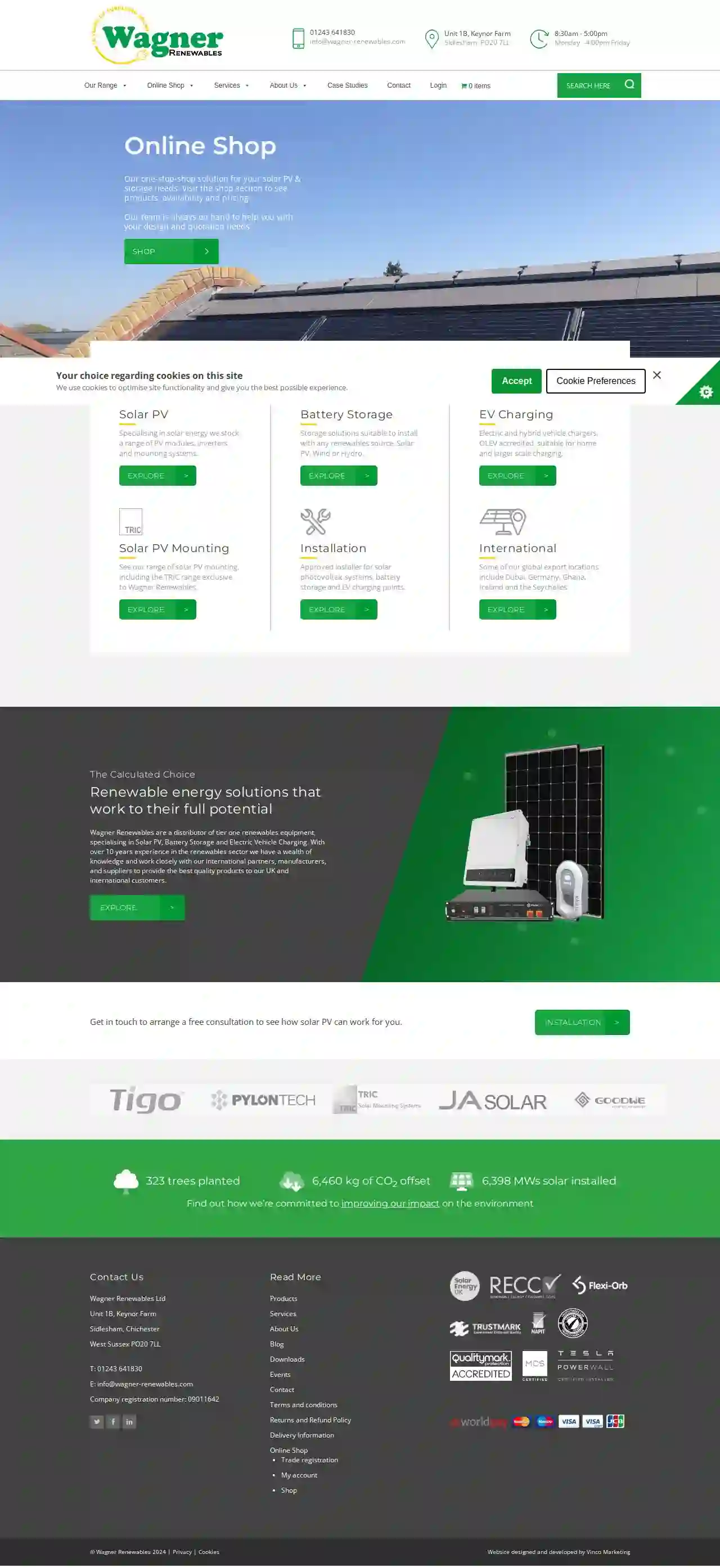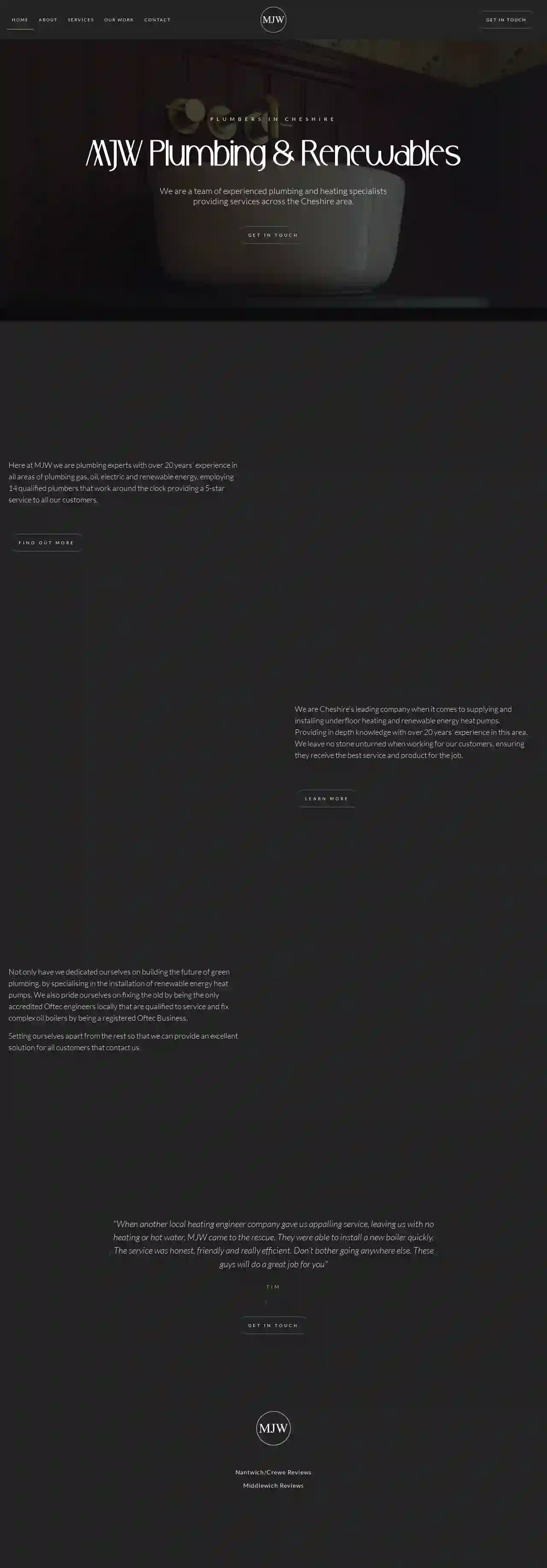Solar Installers Fishguard
Find top Residential Solar Installers in Fishguard
Get 3 FREE Solar Energy Companies quotes for your project today! Compare profiles, reviews, accreditations, portfolio, etc... and choose the best offer.

Astrum Energy Solutions Limited
55 reviewsChester, GBWelcome to Astrum Energy Solutions' online store. Astrum Energy have been supplying and installing solar PV since 2012 and our director has been installing since 2006. We pride ourselves in our honesty and fairness when helping customers choose the right system for them. We are not after the hard sell and continue to support our customers long after the installation date. Not only do we install solar, we also provide a complete off grid power system for properties where the cost of a grid connection sours the dream of a place in the country. Our off grid systems provide power 24/7 and allow the user to live as if connected to the grid. We also install air conditioning as a cheaper running alternative to using oil, electricity and bottled gas. These units can provide both heating and cooling. The cost of running during hot days can be offset by solar panels on the roof. This is especially helpful for people who are conscious of using electricity to provide cooling and thus creating greenhouse gasses. If it's sunny enough to need cooling, then the solar panels will provide the power. We are MCS accredited for solar PV and are F-Gas certified allowing us to install air conditioning systems. We are OLEV approved EV chargepoint installers and all charge points installed by us now qualify for the £350.00 government grant. Call us now on 01925 790 860 to speak to an adviser.
- Services
- Why Us?
- Accreditations
- Gallery
Get Quote
PowerFlow Energy
51 reviewsHereford, GBTransforming energy storage for a decade. It must be our generation's responsibility to invent the future of clean energy technologies, so future generations may prosper in a sustainable world. Our Products The Original Power DiverterWe have been refining our patented power diverters for over 10 years. With a class leading efficiency of 98% and proven reliability. PowerFlow's energy diverters are the premium choice. Convert waste into savings. Our power diverters save energy by directing excess solar energy to heat your hot water or home.
- Services
- Why Us?
- Testimonials
- Gallery
Get Quote
Ten Counties Solar
Queensgate House, 48 Queen Street, Exeter, EX4 3SR, GBTen Counties Solar is a leading specialist solar park support and maintenance provider with nationwide services. We pride ourselves in the delivery of fully integrated solar park installation and maintenance services and offer a single supplier solution to efficient solar park construction and management. With over 30 years' experience in commercial land management and construction industry support services, we provide comprehensive solutions for solar park construction and maintenance. From small scale solar installations to 5MW and larger commercial utility scale solar parks, we have established a client base throughout the UK and Europe as a result of our added value services. Due to the often remote location of sites, our clients have benefitted from the reassurance of our contract management and photographic reporting in addition to our health and safety commitment. We take training and Health and Safety seriously with on-going personal development. Specialist construction operatives are qualified under the Construction Skills Certification Scheme (CSCS) and have passed the health and safety test. We supply comprehensive risk assessments and method statements for all works and Ten Counties is a registered member of Constructionline with £5,000,000 public liability insurance.
- Services
- Why Us?
- Accreditations
- Gallery
Get Quote
Recharge Solar Exeter
52 reviewsWinslade House, Winslade Park, Clyst St Mary, Exeter, EX5 1FY, GBReCharge Solar is a family-run business based in Exeter, serving the South West. With over 20 years of experience in the industry, they are MCS and HIES accredited, providing expert installation of solar PV systems. They offer a range of products and services, including solar panels, batteries, and financing options. ReCharge Solar is committed to helping customers reduce their energy bills, lower their carbon footprint, and contribute to a greener future. They pride themselves on their excellent reputation and customer service, ensuring a smooth and hassle-free experience from initial consultation to installation.
- Services
- Why Us?
- Accreditations
- Testimonials
- Gallery
Get Quote
Lectogic Ltd
4.85 reviewsOld School Garage, Llwynbach Terrace, Hollybush, Blackwood, Gwent, GBLectogic aims to provide businesses with high quality, energy saving solutions without any radical increase in costs. Provide home owners with high quality, sustainable living solutions without any radical increase in costs. Installation and support for solar panel systems – on your roof residential or commercial. We have highlighted here a range of ideas for you to consume less energy and save money. Many of these energy saving devices are suitable for all businesses, from factory units to modern office environments. We can advise on the suitability for your business and provide you with bespoke solutions.
- Services
- Why Us?
- Testimonials
- Gallery
Get Quote
Eco nrg Ltd
4.328 reviewsUnit 10c New Mills Industrial Estate, Modbury, PL21 0TP, GBAward winning experts in the design and installation of cutting edge renewable technologies, including Solar PV, Heat Pumps, Charging Points, Battery Storage and more. Hundreds of successful installations throughout Devon and the South West. Find out how much you could save and join hundreds of happy customers with a no obligation survey today! Welcome to Eco Nrg Ltd, your local, award-winning experts in the design and installation of bespoke renewable energy systems. We've completed hundreds of installations of Solar Panels, Air Source Heat Pumps, Vehicle Chargers and Battery systems across the South West of England, working in Plymouth, Exeter, Truro, Bristol and more. With over 50 years combined experience in the renewable energy sector, we're here to make your dreams of a sustainable future, a reality. We’re committed to delivering every part of your project to the highest possible standard, ensuring that every Eco nrg system continues to exceed expectations throughout its working life, as well as offering an unbeatable guarantee on all our products.
- Services
- Why Us?
- Accreditations
- Our Team
- Testimonials
- Gallery
Get Quote
Olympus Power Limited
4.715 reviewsExeter, GBOlympus Power is a leading provider of renewable energy solutions for businesses. With over 40 years of experience, our award-winning team develops and finances commercial systems to deliver predictable and cheaper energy from sustainable sources. We understand the unique needs of each business and tailor our solutions accordingly. Our services include roof-mounted solar, ground-mounted solar, voltage optimisation, battery storage, grid constraint solutions, electric vehicle charging, and hydrogen production. We also offer comprehensive operation and maintenance services to ensure the long-term performance of your renewable energy system. At Olympus Power, we are committed to helping businesses reduce their carbon footprint and achieve their sustainability goals.
- Services
- Why Us?
- Gallery
Get Quote
Locate Estate Agent
4.991 reviews3 Victoria Parade, Urmston, M41 9BP, GBLocate Estate Agents are a local, independently run estate agency specialising in residential sales and lettings in Urmston, Flixton, Davyhulme, Partington, Stretford, Salford and surrounding areas. We believe in providing excellent customer service and treating each client the way we would want to be treated. After working as an Estate Agent for many years, our Director observed first hand a clear lack of good customer service, honesty and transparency within the industry. We are here to guide you through the sales and lettings process every step of the way providing a friendly and honest approach. Our hybrid agency is a concept which is fast becoming the way to buy and sell properties. You have the luxury of having as much or as little input into selling your property as you wish, with no additional costs. As well as your input we have experienced staff who will be in regular contact with you, enabling the process to run as smooth as possible. We are located in a town centre location in our bright welcoming offices. Not having the fancy trimmings enables us to keep the cost of fees down and focus more on your property and you. Our experienced team all live and have worked within the area for many years, selling many local properties. We have children in the local schools and we fully understand our social responsibility as part of this great community, to help grow the local economy. Our team is on hand to offer any advice or answer any questions on a wide range of property related enquiries.
- Services
- Why Us?
- Accreditations
- Our Team
- Testimonials
- Gallery
Get Quote
Wagner Renewables Ltd
54 reviewsUnit 1B, Keynor Farm, Sidlesham, PO20 7LL, GBWagner Renewables are a distributor of tier one renewables equipment, specialising in Solar PV, Battery Storage and Electric Vehicle Charging. With over 10 years experience in the renewables sector we have a wealth of knowledge and work closely with our international partners, manufacturers, and suppliers to provide the best quality products to our UK and international customers. Helping you Go Green, Large scale rooftop & commercial solar PV installation specialists. Contact us today to see how we can reduce your business energy costs.
- Services
- Why Us?
- Accreditations
- Our Team
- Gallery
Get Quote
MJW Renewable Energy Services
Chester, GBMJW Plumbing & Renewables is a team of experienced plumbing and heating specialists providing services across the Cheshire area. With over 20 years' experience in all areas of plumbing, gas, oil, electric, and renewable energy, employing 14 qualified plumbers that work around the clock providing a 5-star service to all our customers.
- Services
- Why Us?
- Accreditations
- Our Team
- Testimonials
- Gallery
Get Quote
Over 3,485+ Solar Installers onboarded
Our solar pros operate in Fishguard & surroundings!
SolarCompaniesHub has curated and vetted the Best Solar Installers in and around Fishguard. Find a top & trustworthy contractor today.
Frequently Asked Questions About Solar Installers
- Solar Panel Warranty: From the panel manufacturer, typically covering defects in materials and workmanship for 10-25 years. Some manufacturers offer performance guarantees, ensuring a certain level of energy output over time.
- Solar Installation Warranty: From the solar installer, covering the quality of the installation work for 1-10 years. This warranty protects you from leaks, faulty wiring, or other issues caused by improper installation.
How do solar panels work?
Will solar panels work during cloudy days or at night?
What kind of warranty should I expect for my solar panel system?
What is net metering, and how does it work?
How do solar panels work?
Will solar panels work during cloudy days or at night?
What kind of warranty should I expect for my solar panel system?
- Solar Panel Warranty: From the panel manufacturer, typically covering defects in materials and workmanship for 10-25 years. Some manufacturers offer performance guarantees, ensuring a certain level of energy output over time.
- Solar Installation Warranty: From the solar installer, covering the quality of the installation work for 1-10 years. This warranty protects you from leaks, faulty wiring, or other issues caused by improper installation.